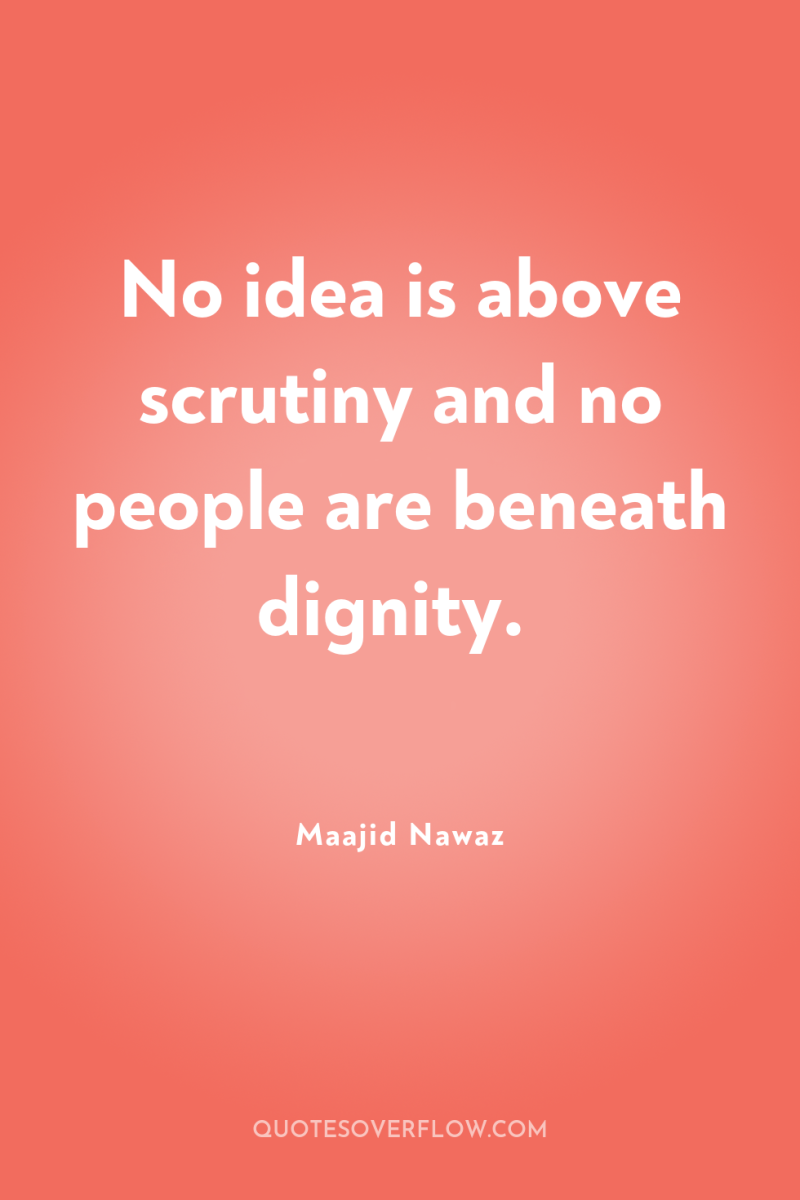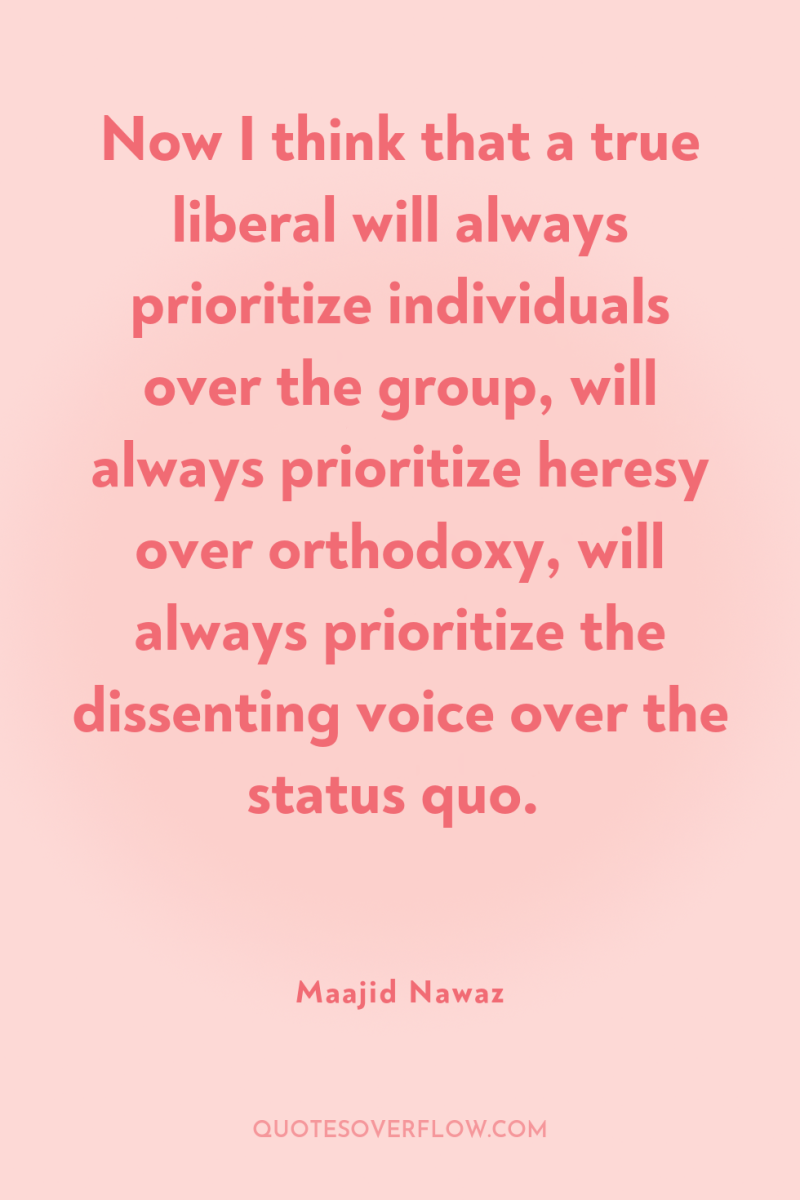
1
No idea is above scrutiny and no people are beneath dignity.Maajid Nawaz

2
Now I think that a true liberal will always prioritize individuals over the group, will always prioritize heresy over orthodoxy, will always prioritize the dissenting voice over the status quo.Maajid Nawaz
3
The great liberal betrayal of this generation is that in the name of liberalism, communal rights have been prioritized over individual autonomy within minority groups. And minorities within minorities really do suffer because of this betrayal.Maajid Nawaz
4
President Barack Obama and many liberal-minded commentators have been hesitant to call this Islamist ideology by its proper name. They seem to fear that both Muslim communities and the religiously intolerant will hear the word “Islam” and simply assume that all Muslims are being held responsible for the excesses of the jihadist few. I call this the Voldemort effect, after the villain in J.K. Rowling’s Harry Potter books. Many well-meaning people in Ms. Rowling’s fictional world are so petrified of Voldemort’s evil that they do two things: They refuse to call Voldemort by name, instead referring to “He Who Must Not Be Named, ” and they deny that he exists in the first place. Such dread only increases public hysteria, thus magnifying the appeal of Voldemort’s power. The same hysteria about Islamism is unfolding before our eyes. But no strategy intended to defeat Islamism can succeed if Islamism itself and its violent expression in jihadism are not first named, isolated and understood. From: Maajid Nawaz's article titled, 'How to Beat Islamic State', December 11th, 2015. .Maajid Nawaz
5
More violence does not necessarily equate with greater religious conviction.Maajid Nawaz
6
We can’t remain silent on gender rights and personal freedoms.Maajid Nawaz
7
The great liberal betrayal of this generation is that in the name of liberalism, communal rights have been prioritized over individual autonomy within minority groups. And minorities within minorities really do suffer because of this betrayal. The people I really worry about when we have this conversation are feminist Muslims, gay Muslims, ex- Muslims–all the vulnerable and bullied individuals who are not just stigmatized but in many cases violently assaulted or killed merely for being against the norm.Maajid Nawaz
8
Counterinsurgency rests on the assumption that the enemy has significant support in the communities from which it recruits. The aim of counterinsurgency strategy is to deny the enemy any propaganda victories that can further fuel its recruitment. Insurgents must be isolated from their targeted host communities. This requires a combination of psychological, physical and economic warfare, all with the aim of undermining the insurgents’ ideological, operational and financial capabilities. From: Maajid Nawaz's article titled, 'How to Beat Islamic State', December 11th, 2015 .Maajid Nawaz
9
We’re currently faced with two entirely different challenges — facing down Islamism and jihadism on the one hand, and advancing human rights and democratic culture on the other.Maajid Nawaz
10
There has been a failure to grasp how competing narratives fight for the attention of angry young Muslims, and we have grossly underestimated the appeal of the jihadist brand.Maajid Nawaz
11
I say I haven't lost my religion. I've lost my ideology.Maajid Nawaz
12
I had a mind inquiring enough to question world events, as well as the passion fostered by my background to care, but I lacked the emotional maturity to process these things. That made me ripe for Islamist recruitment. Into this ferment came my recruiter, himself straight out of a London medical college.Maajid Nawaz
13
The British state already invests in early intervention campaigns in drug abuse and sexual health. Challenging extremism should be no less of a priority.Maajid Nawaz
14
Increased sympathy for an Islamist cause, lack of integration, and the absence of acceptance of Muslims into British society makes it harder for Muslims to challenge Islamism and tough for non- Muslims to understand it.Maajid Nawaz
15
The positive is I'm delighted at the way the Liberal Democrats as a party have supported me and the way in which the work I'm doing, through the Liberal Democrats, has abled to broaden some of the work I work on.Maajid Nawaz
16
Unity in faith is theocracy unity in politics is fascism.Maajid Nawaz
17
There are members - very, very close and dear members - of my family - I'm talking immediate family - who simply don't speak to me anymore and haven't done so for years. My marriage fell apart.Maajid Nawaz
18
I was filled with hate and anger. But during my trial, something decisive happened: Amnesty International adopted me as a prisoner of conscience, and it was an unbelievable feeling to know that there is someone fighting for you on the outside. Amnesty's 'soft' approach made me seriously consider alternatives to revenge.Maajid Nawaz
19
Hizb ut- Tahrir spearheaded the radicalization of the 1990s and cultivated an atmosphere of anger.Maajid Nawaz
20
In an open society, no idea can be above scrutiny, just as no people should be beneath dignity.Maajid Nawaz
21
My feminism, as intended by me, extends to empowering women to make legal choices, not to judge the legal choices they make. My fight is for rights.Maajid Nawaz
22
In today's Britain, the weakest among us are often assumed to be minority communities. In fact, the weakest are those minorities-within-minorities for whom the legal right to exit from their communities' constraints amounts to nothing before the enforcement of cultural and religious shaming.Maajid Nawaz